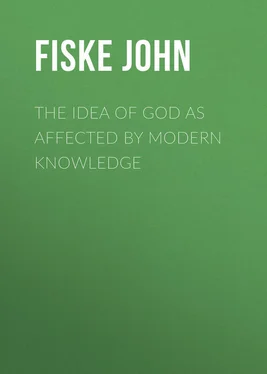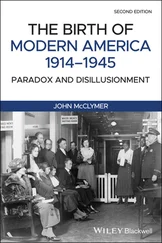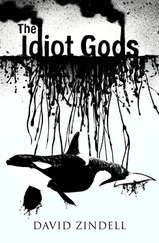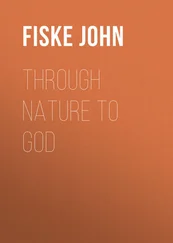John Fiske - The Idea of God as Affected by Modern Knowledge
Здесь есть возможность читать онлайн «John Fiske - The Idea of God as Affected by Modern Knowledge» — ознакомительный отрывок электронной книги совершенно бесплатно, а после прочтения отрывка купить полную версию. В некоторых случаях можно слушать аудио, скачать через торрент в формате fb2 и присутствует краткое содержание. Жанр: foreign_antique, foreign_prose, на английском языке. Описание произведения, (предисловие) а так же отзывы посетителей доступны на портале библиотеки ЛибКат.
- Название:The Idea of God as Affected by Modern Knowledge
- Автор:
- Жанр:
- Год:неизвестен
- ISBN:нет данных
- Рейтинг книги:4 / 5. Голосов: 1
-
Избранное:Добавить в избранное
- Отзывы:
-
Ваша оценка:
- 80
- 1
- 2
- 3
- 4
- 5
The Idea of God as Affected by Modern Knowledge: краткое содержание, описание и аннотация
Предлагаем к чтению аннотацию, описание, краткое содержание или предисловие (зависит от того, что написал сам автор книги «The Idea of God as Affected by Modern Knowledge»). Если вы не нашли необходимую информацию о книге — напишите в комментариях, мы постараемся отыскать её.
The Idea of God as Affected by Modern Knowledge — читать онлайн ознакомительный отрывок
Ниже представлен текст книги, разбитый по страницам. Система сохранения места последней прочитанной страницы, позволяет с удобством читать онлайн бесплатно книгу «The Idea of God as Affected by Modern Knowledge», без необходимости каждый раз заново искать на чём Вы остановились. Поставьте закладку, и сможете в любой момент перейти на страницу, на которой закончили чтение.
Интервал:
Закладка:
This conclusion as to the implications of the doctrine of evolution concerning Man's place in Nature supplies the element wanting in the theistic theory set forth in "Cosmic Philosophy," – the teleological element. It is profoundly true that a theory of things may seem theistic or atheistic in virtue of what it says of Man, no less than in virtue of what it says of God. The craving for a final cause is so deeply rooted in human nature that no doctrine of theism which fails to satisfy it can seem other than lame and ineffective. In writing "Cosmic Philosophy" I fully realized this when, in the midst of the argument against Paley's form of theism, I said that "the process of evolution is itself the working out of a mighty Teleology of which our finite understandings can fathom but the scantiest rudiments." Nevertheless, while the whole momentum of my thought carried me to the conviction that it must be so, I was not yet able to indicate how it is so, and I accordingly left the subject with this brief and inadequate hint. Could the point have been worked out then and there, I think it would have left no doubt in the minds of "Physicus" and Mr. Pollock as to the true character of Cosmic Theism.
But hold, cries the scientific inquirer, what in the world are you doing? Are we again to resuscitate the phantom Teleology, which we had supposed at last safely buried between cross-roads and pinned down with a stake? Was not Bacon right in characterizing "final causes" as vestal virgins, so barren has their study proved? And has not Huxley, with yet keener sarcasm, designated them the hetairæ of philosophy, so often have they led men astray? Very true. I do not wish to take back a single word of all that I have said in my chapter on "Anthropomorphic Theism" in condemnation of the teleological method and the peculiar theistic doctrines upon which it rests. As a means of investigation it is absolutely worthless. Nay, it is worse than worthless; it is treacherous, it is debauching to the intellect. But that is no reason why, when a distinct dramatic tendency in the events of the universe appears as the result of purely scientific investigation, we should refuse to recognize it. It is the object of the "Destiny of Man" to prove that there is such a dramatic tendency; and while such a tendency cannot be regarded as indicative of purpose in the limited anthropomorphic sense, it is still, as I said before, the objective aspect of that which, when regarded on its subjective side, we call Purpose. There is a reasonableness in the universe such as to indicate that the Infinite Power of which it is the multiform manifestation is psychical, though it is impossible to ascribe to Him any of the limited psychical attributes which we know, or to argue from the ways of Man to the ways of God. For, as St. Paul reminds us, "who hath known the mind of the Lord, or who hath been his counsellor?"
It is in this sense that I accept Mr. Spencer's doctrine of the Unknowable. How far my interpretation agrees with his own I do not undertake to say. On such an abstruse matter it is best that one should simply speak for one's self. But in his recent essay on "Retrogressive Religion" he uses expressions which imply a doctrine of theism essentially similar to that here maintained. The "infinite and eternal Energy from which all things proceed," and which is the same power that "in ourselves wells up under the form of consciousness," is certainly the power which is here recognized as God. The term "Unknowable" I have carefully refrained from using; it does not occur in the text of this essay. It describes only one aspect of Deity, but it has been seized upon by shallow writers of every school, treated as if fully synonymous with Deity, and made the theme of the most dismal twaddle that the world has been deluged with since the days of mediæval scholasticism. The latest instance is the wretched positivist rubbish which Mr. Frederic Harrison has mistaken for criticism, and to which it is almost a pity that Mr. Spencer should have felt called upon to waste his valuable time in replying. That which Mr. Spencer throughout all his works regards as the All-Being, the Power of which "our lives, alike physical and mental, in common with all the activities, organic and inorganic, amid which we live, are but the workings," – this omnipresent Power it pleases Mr. Harrison to call the "All-Nothingness," to describe it as "a logical formula begotten in controversy, dwelling apart from man and the world" (whatever all that may mean), and to imagine its worshippers as thus addressing it in prayer, "O x n, love us, help us, make us one with thee!" If Mr. Harrison's aim were to understand, rather than to misrepresent, the religious attitude which goes with such a conception of Deity as Mr. Spencer's, he could nowhere find it more happily expressed than in these wonderful lines of Goethe: —
"Weltseele, komm, uns zu durchdringen!
Dann mit dem Weltgeist selbst zu ringen
Wird unsrer Kräfte Hochberuf.
Theilnehmend führen gute Geister,
Gelinde leitend, höchste Meister,
Zu dem der alles schafft und schuf."
Mr. Harrison is enabled to perform his antics simply because he happens to have such a word as "Unknowable" to play with. Yet the word which has been put to such unseemly uses is, when properly understood, of the highest value in theistic philosophy. That Deity per se is not only unknown but unknowable is a truth which Mr. Spencer has illustrated with all the resources of that psychologic analysis of which he is incomparably the greatest master the world has ever seen; but it is not a truth which originated with him, or the demonstration of which is tantamount, as Mr. Harrison would have us believe, to the destruction of all religion. Among all the Christian theologians that have lived, there are few higher names than Athanasius, who also regarded Deity per se as unknowable, being revealed to mankind only through incarnation in Christ. It is not as failing to recognize its value that I have refrained in this essay from using the term "Unknowable;" it is because so many false and stupid inferences have been drawn from Mr. Spencer's use of the word that it seemed worth while to show how a doctrine essentially similar to his might be expounded without introducing it. For further elucidation I will simply repeat in this connection what I wrote long ago: "It is enough to remind the reader that Deity is unknowable just in so far as it is not manifested to consciousness through the phenomenal world, – knowable just in so far as it is thus manifested: unknowable in so far as infinite and absolute, – knowable in the order of its phenomenal manifestations; knowable, in a symbolic way, as the Power which is disclosed in every throb of the mighty rhythmic life of the universe; knowable as the eternal Source of a Moral Law which is implicated with each action of our lives, and in obedience to which lies our only guaranty of the happiness which is incorruptible, and which neither inevitable misfortune nor unmerited obloquy can take away. Thus, though we may not by searching find out God, though we may not compass infinitude or attain to absolute knowledge, we may at least know all that it concerns us to know, as intelligent and responsible beings. They who seek to know more than this, to transcend the conditions under which alone is knowledge possible, are, in Goethe's profound language, as wise as little children who, when they have looked into a mirror, turn it around to see what is behind it." ("Cosmic Philosophy," vol. ii. p. 470.)
The present essay must be regarded as a sequel to the "Destiny of Man," – so much so that the force of the argument in the concluding section can hardly be appreciated without reference to the other book. The two books, taken together, contain the bare outlines of a theory of religion which I earnestly hope at some future time to state elaborately in a work on the true nature of Christianity. Some such scheme had begun vaguely to dawn upon my mind when I was fourteen years old, and thought in the language of the rigid Calvinistic orthodoxy then prevalent in New England. After many and extensive changes of opinion, the idea assumed definite shape in the autumn of 1869, when I conceived the plan of a book to be entitled "Jesus of Nazareth and the Founding of Christianity," – a work intended to deal on the one hand with the natural genesis of the complex aggregate of beliefs and aspirations known as Christianity, and on the other hand with the metamorphoses which are being wrought in this aggregate by modern knowledge and modern theories of the universe. Such a book, involving a treatment both historical and philosophical, requires long and varied preparation; and I have always regarded my other books, published from time to time, as simply wayside studies preliminary to the undertaking of this complicated and difficult task. While thus habitually shaping my work with reference to this cherished idea, I have written some things which are in a special sense related to it. The rude outlines of a very small portion of the historical treatment are contained in the essays on "The Jesus of History," and "The Christ of Dogma," published in the volume entitled "The Unseen World, and Other Essays." The outlines of the philosophical treatment are partially set forth in the "Destiny of Man" and in the present work.
Читать дальшеИнтервал:
Закладка:
Похожие книги на «The Idea of God as Affected by Modern Knowledge»
Представляем Вашему вниманию похожие книги на «The Idea of God as Affected by Modern Knowledge» списком для выбора. Мы отобрали схожую по названию и смыслу литературу в надежде предоставить читателям больше вариантов отыскать новые, интересные, ещё непрочитанные произведения.
Обсуждение, отзывы о книге «The Idea of God as Affected by Modern Knowledge» и просто собственные мнения читателей. Оставьте ваши комментарии, напишите, что Вы думаете о произведении, его смысле или главных героях. Укажите что конкретно понравилось, а что нет, и почему Вы так считаете.












